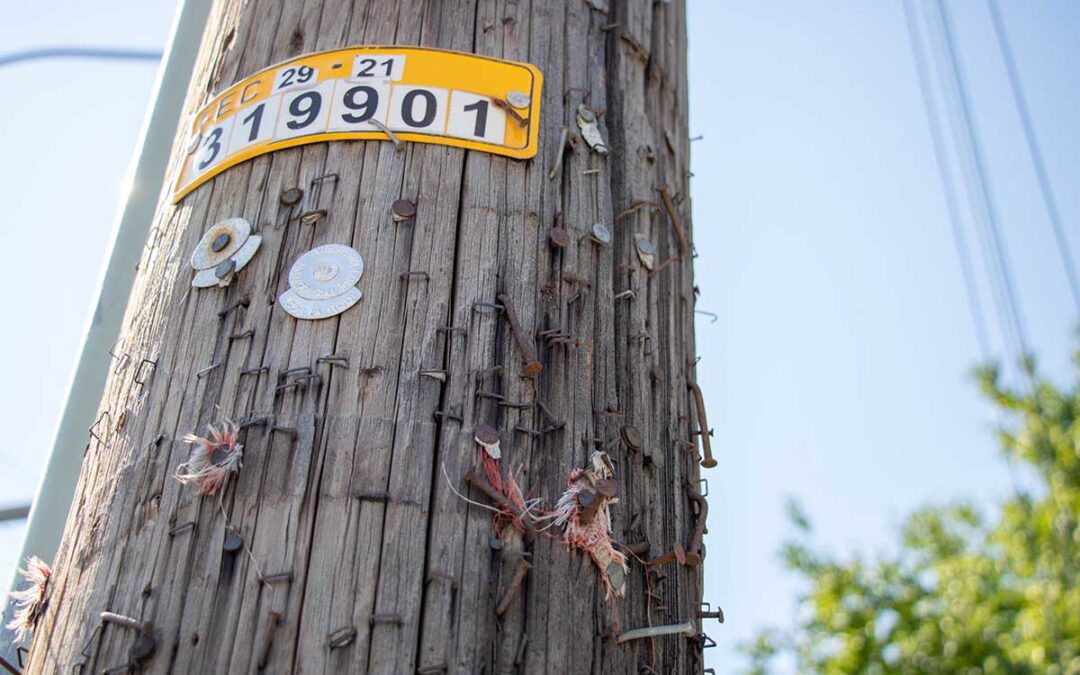Above: Leftover tacks, staples and nails on a wooden power pole can puncture lineworker equipment, causing serious harm. (Photo By: Sharilyn Fairweather/Flathead EC)
When an evangelical group was hanging bright yellow signs with the words “Jesus Saves” on wooden power poles this summer, a Montana electric cooperative turned a potentially divisive issue into an educational opportunity.
Each time a lineworker removed a sign, fastened near the cross arms, another would reappear the next day “sometimes in the same spot,” said Sharilyn Fairweather, a multimedia design specialist at Kalispell-based Flathead Electric Cooperative.
“Whoever was hanging them had a special, long-armed stapler, which is different from what we normally experienced,” she said. “Usually, the signs are at eye-level for yard sales or lost cats.”
The activity has tapered off, but during its height in July, the co-op received about two or three calls daily—nearly four dozen in total. Some callers were annoyed, said Fairweather, while others asked “if they could hang signs on our poles to advertise their business.”
To handle this potentially sensitive issue, the co-op refreshed its existing “garage sale season” campaign, focusing instead on the safety risks of attaching anything to power poles. And while hanging signs on poles isn’t illegal in Montana as it is in some other states, it violates the National Electric Safety Code, which prohibits an “attachment of any kind to a supporting structure of a utility line…without the concurrence of the structure owner.”
“We wanted to be sure we were responding to the placement of the signs on the poles, otherwise it could have been misconstrued that we were responding to their message,” said Courtney Stone, the co-op’s communications and marketing supervisor.
The safety messages ran on all the co-op’s social media platforms, on its website and in its monthly newsletter. The messages highlighted the hazards of foreign objects on poles to lineworkers and the resources required for removal.
While taking member phone calls, Stone continued, “we really tried to check in with people towards the end of the phone call to make sure they had received the message that power poles are not bulletin boards and that we need to keep our linemen safe. We would try to paint images of linemen out at 3 a.m. during a howling blizzard and it's negative 40. And the last thing they need is to get caught by a staple or a nail.”
While small to the eye, leftover staples, tacks and nails can pose significant dangers to lineworkers. Sharp objects can puncture lineworkers’ personal protective equipment designed to insulate them against potentially fatal electrical contacts.
It’s a problem faced by co-ops across the county. “Even the smallest hole will no longer insulate them from live wires,” said Amanda Mills, communication manager at Dixie Electric Power Association, based in Laurel, Mississippi. “Or, if they have to climb poles it can snag their clothing, making them fall and causing injury—which has happened.”
During the 1990s, an errant nail from a leftover sign ripped open the arm of a Dixie EPA lineworker from the wrist to the elbow, requiring surgery and a lengthy recovery, Mills said.
Since then, about twice a year, the co-op takes to social media and local TV news stations to discourage the practice, which is illegal in Mississippi.
“It’s an ongoing issue. We encourage people to please take down the signs,” Mills said. “Because not only is it against Mississippi law, it's against the National Electrical Safety Code. And anytime you put a foreign object into one of those poles, you're deteriorating the pole, which makes us have to replace it quicker, which is another expense to the members.”
Next month, Flathead EC plans to release a video commercial on local TV with the message: “Please do not place signs on power poles.” By framing the issue as a public service announcement, Stone said, the co-op can reach an influx of new members—about 6,000 since 2020—and remind all members “about what it means to be a not-for-profit cooperative, how we’re different than an IOU, and for every person that we have to send out to remove the signs, it really does impact our bottom line, which is their bottom line.”
Source: Cooperative.com

